原因状语从句
- 格式:doc
- 大小:38.50 KB
- 文档页数:4
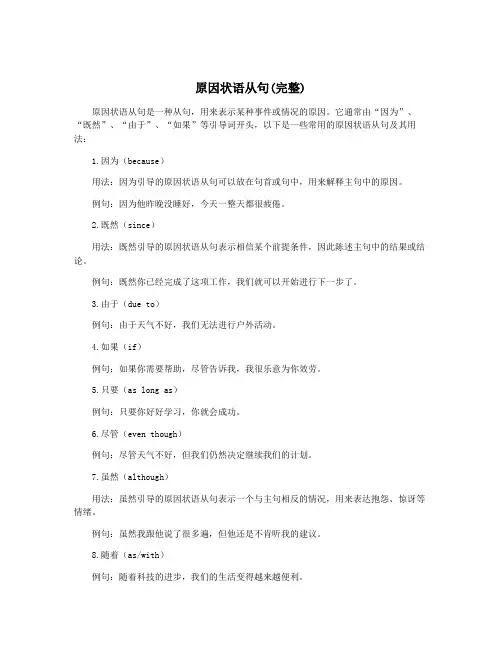
原因状语从句(完整)
原因状语从句是一种从句,用来表示某种事件或情况的原因。
它通常由“因为”、“既然”、“由于”、“如果”等引导词开头,以下是一些常用的原因状语从句及其用法:
1.因为(because)
用法:因为引导的原因状语从句可以放在句首或句中,用来解释主句中的原因。
例句:因为他昨晚没睡好,今天一整天都很疲倦。
2.既然(since)
用法:既然引导的原因状语从句表示相信某个前提条件,因此陈述主句中的结果或结论。
例句:既然你已经完成了这项工作,我们就可以开始进行下一步了。
3.由于(due to)
例句:由于天气不好,我们无法进行户外活动。
4.如果(if)
例句:如果你需要帮助,尽管告诉我,我很乐意为你效劳。
5.只要(as long as)
例句:只要你好好学习,你就会成功。
6.尽管(even though)
例句:尽管天气不好,但我们仍然决定继续我们的计划。
7.虽然(although)
用法:虽然引导的原因状语从句表示一个与主句相反的情况,用来表达抱怨、惊讶等情绪。
例句:虽然我跟他说了很多遍,但他还是不肯听我的建议。
8.随着(as/with)
例句:随着科技的进步,我们的生活变得越来越便利。
总之,原因状语从句是一种非常重要的语法结构,它可以表达出各种事件或情况的原因,让句子的意思更加清晰明了。
希望通过以上的例句和用法介绍,能够帮助大家更好地掌握原因状语从句的用法。
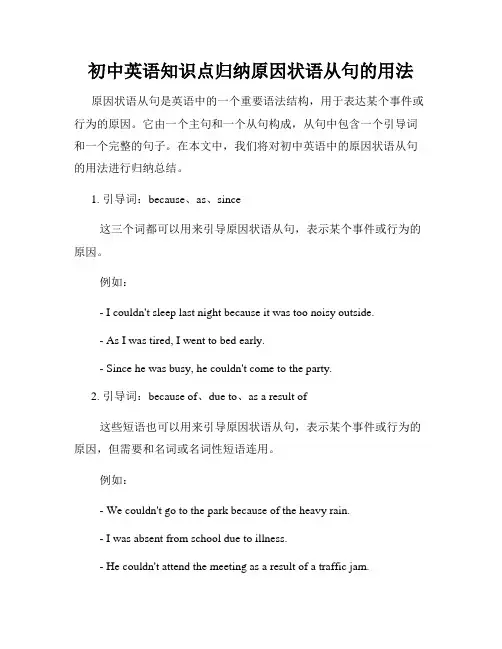
初中英语知识点归纳原因状语从句的用法原因状语从句是英语中的一个重要语法结构,用于表达某个事件或行为的原因。
它由一个主句和一个从句构成,从句中包含一个引导词和一个完整的句子。
在本文中,我们将对初中英语中的原因状语从句的用法进行归纳总结。
1. 引导词:because、as、since这三个词都可以用来引导原因状语从句,表示某个事件或行为的原因。
例如:- I couldn't sleep last night because it was too noisy outside.- As I was tired, I went to bed early.- Since he was busy, he couldn't come to the party.2. 引导词:because of、due to、as a result of这些短语也可以用来引导原因状语从句,表示某个事件或行为的原因,但需要和名词或名词性短语连用。
例如:- We couldn't go to the park because of the heavy rain.- I was absent from school due to illness.- He couldn't attend the meeting as a result of a traffic jam.3. 引导词:since、as、now that这些词可以用来引导原因状语从句,表示某个事件或行为的原因,并且暗示着原因是已知的或对方已经了解。
例如:- Since you are not feeling well, you should stay home and rest.- As it is getting late, we should leave now.- Now that you have finished your homework, you can watch TV.4. 引导词:in order that、so that这些词可以用来引导原因状语从句,表达某个事件或行为的目的。

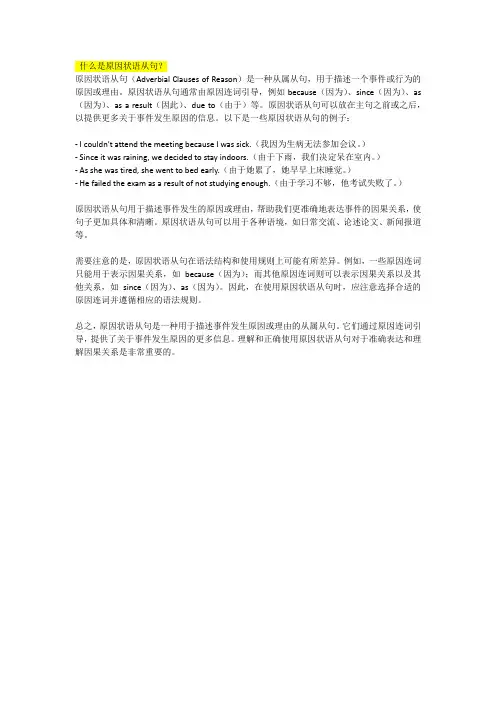
什么是原因状语从句?原因状语从句(Adverbial Clauses of Reason)是一种从属从句,用于描述一个事件或行为的原因或理由。
原因状语从句通常由原因连词引导,例如because(因为)、since(因为)、as (因为)、as a result(因此)、due to(由于)等。
原因状语从句可以放在主句之前或之后,以提供更多关于事件发生原因的信息。
以下是一些原因状语从句的例子:- I couldn't attend the meeting because I was sick.(我因为生病无法参加会议。
)- Since it was raining, we decided to stay indoors.(由于下雨,我们决定呆在室内。
)- As she was tired, she went to bed early.(由于她累了,她早早上床睡觉。
)- He failed the exam as a result of not studying enough.(由于学习不够,他考试失败了。
)原因状语从句用于描述事件发生的原因或理由,帮助我们更准确地表达事件的因果关系,使句子更加具体和清晰。
原因状语从句可以用于各种语境,如日常交流、论述论文、新闻报道等。
需要注意的是,原因状语从句在语法结构和使用规则上可能有所差异。
例如,一些原因连词只能用于表示因果关系,如because(因为);而其他原因连词则可以表示因果关系以及其他关系,如since(因为)、as(因为)。
因此,在使用原因状语从句时,应注意选择合适的原因连词并遵循相应的语法规则。
总之,原因状语从句是一种用于描述事件发生原因或理由的从属从句。
它们通过原因连词引导,提供了关于事件发生原因的更多信息。
理解和正确使用原因状语从句对于准确表达和理解因果关系是非常重要的。
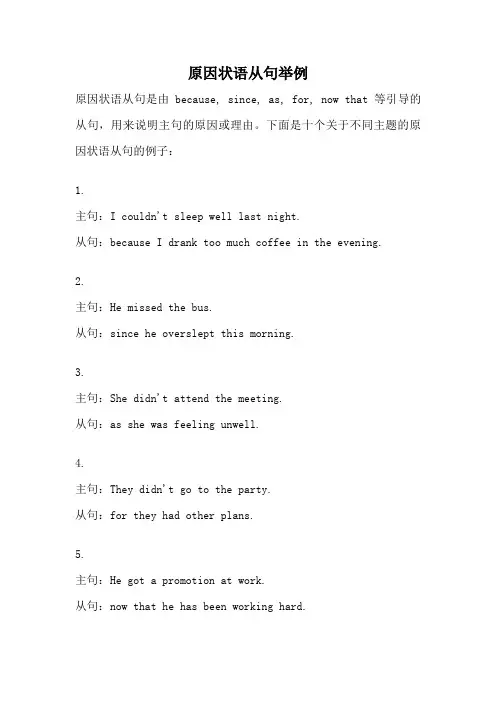
原因状语从句举例原因状语从句是由because, since, as, for, now that等引导的从句,用来说明主句的原因或理由。
下面是十个关于不同主题的原因状语从句的例子:1.主句:I couldn't sleep well last night.从句:because I drank too much coffee in the evening.2.主句:He missed the bus.从句:since he overslept this morning.3.主句:She didn't attend the meeting.从句:as she was feeling unwell.4.主句:They didn't go to the party.从句:for they had other plans.5.主句:He got a promotion at work.从句:now that he has been working hard.6.主句:They cancelled the flight.从句:because of the bad weather conditions.7.主句:The car broke down.从句:since it hadn't been properly maintained.8.主句:She got a high score on the exam.从句:because she studied diligently.9.主句:The restaurant was closed.从句:as it was a public holiday.10.主句:He didn't buy the expensive watch.从句:for he couldn't afford it.以上是关于不同主题的十个原因状语从句的例子,它们用于解释主句中发生的事件或情况的原因或理由。
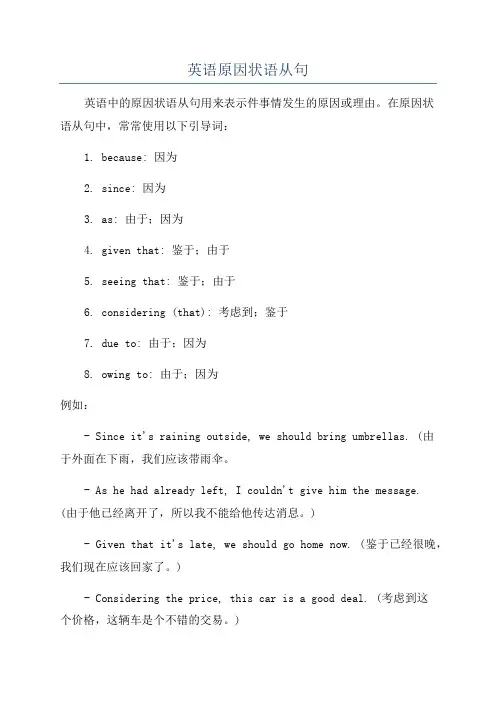
英语原因状语从句
英语中的原因状语从句用来表示件事情发生的原因或理由。
在原因状
语从句中,常常使用以下引导词:
1. because: 因为
2. since: 因为
3. as: 由于;因为
4. given that: 鉴于;由于
5. seeing that: 鉴于;由于
6. considering (that): 考虑到;鉴于
7. due to: 由于;因为
8. owing to: 由于;因为
例如:
- Since it's raining outside, we should bring umbrellas. (由
于外面在下雨,我们应该带雨伞。
- As he had already left, I couldn't give him the message. (由于他已经离开了,所以我不能给他传达消息。
)
- Given that it's late, we should go home now. (鉴于已经很晚,我们现在应该回家了。
)
- Considering the price, this car is a good deal. (考虑到这
个价格,这辆车是个不错的交易。
)
- Due to bad weather, the flight was cancelled. (由于恶劣的
天气,航班被取消了。
)
- Owing to his hard work, he was promoted. (由于他的努力工作,他得到了晋升。
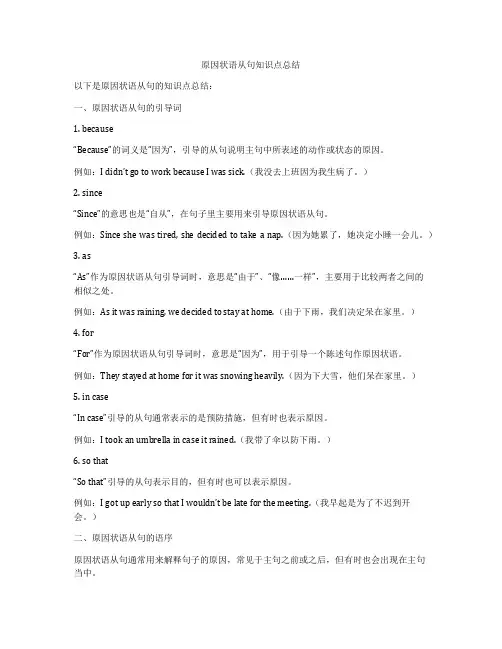
原因状语从句知识点总结以下是原因状语从句的知识点总结:一、原因状语从句的引导词1. because“Because”的词义是“因为”,引导的从句说明主句中所表述的动作或状态的原因。
例如:I didn’t go to work because I was sick.(我没去上班因为我生病了。
)2. since“Since”的意思也是“自从”,在句子里主要用来引导原因状语从句。
例如:Since she was tired, she decided to take a nap.(因为她累了,她决定小睡一会儿。
)3. as“As”作为原因状语从句引导词时,意思是“由于”、“像……一样”,主要用于比较两者之间的相似之处。
例如:As it was raining, we decided to stay at home.(由于下雨,我们决定呆在家里。
)4. for“For”作为原因状语从句引导词时,意思是“因为”,用于引导一个陈述句作原因状语。
例如:They stayed at home for it was snowing heavily.(因为下大雪,他们呆在家里。
)5. in case“In case”引导的从句通常表示的是预防措施,但有时也表示原因。
例如:I took an umbrella in case it rained.(我带了伞以防下雨。
)6. so that“So that”引导的从句表示目的,但有时也可以表示原因。
例如:I got up early so that I wouldn’t be late for the meeting.(我早起是为了不迟到开会。
)二、原因状语从句的语序原因状语从句通常用来解释句子的原因,常见于主句之前或之后,但有时也会出现在主句当中。
例如:I stayed at home because it was raining.(因为下雨,我呆在家里。
)三、原因状语从句的时态原因状语从句的时态一般使用一般现在时态或现在进行时态。
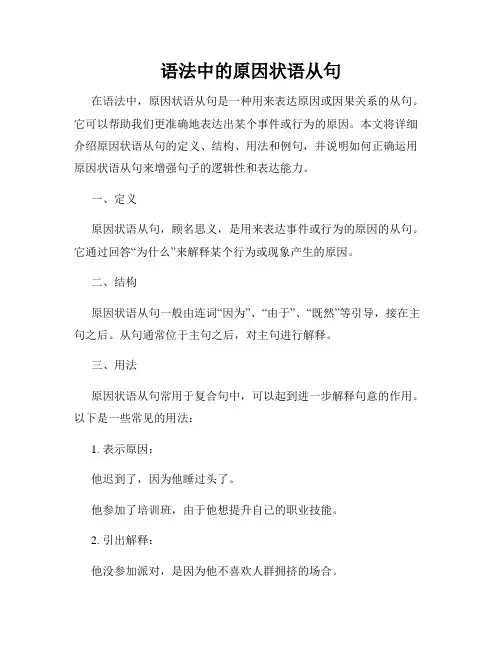
语法中的原因状语从句在语法中,原因状语从句是一种用来表达原因或因果关系的从句。
它可以帮助我们更准确地表达出某个事件或行为的原因。
本文将详细介绍原因状语从句的定义、结构、用法和例句,并说明如何正确运用原因状语从句来增强句子的逻辑性和表达能力。
一、定义原因状语从句,顾名思义,是用来表达事件或行为的原因的从句。
它通过回答“为什么”来解释某个行为或现象产生的原因。
二、结构原因状语从句一般由连词“因为”、“由于”、“既然”等引导,接在主句之后。
从句通常位于主句之后,对主句进行解释。
三、用法原因状语从句常用于复合句中,可以起到进一步解释句意的作用。
以下是一些常见的用法:1. 表示原因:他迟到了,因为他睡过头了。
他参加了培训班,由于他想提升自己的职业技能。
2. 引出解释:他没参加派对,是因为他不喜欢人群拥挤的场合。
她早退了,既然她生病了。
3. 表达原因假设:如果你不理解这个概念,那是因为你没有详细阅读说明书。
要想保持健康的身体,必须定期锻炼,因为运动有助于增强免疫力。
四、使用注意事项在使用原因状语从句时,需要注意以下几点:1. 识别引导词:例如“因为”、“由于”、“既然”等,这些词往往是引导原因状语从句的信号词。
2. 注意时态和语态:原因状语从句通常与主句保持一致的时态和语态。
3. 避免使用短语:原因状语从句应该是一个完整的句子,避免使用短语或单个词作为原因状语。
4. 注意逻辑关系:原因状语从句应该与主句之间有明确的逻辑关系,确保表达的原因与所述的行为或事件相符。
五、例句为了更好地理解原因状语从句的用法,以下是一些例句:1. 他没来上课,因为他生病了。
2. 他退学了,是因为他找到了一份全职工作。
3. 我决定留下来,因为我觉得这个城市很适合我。
4. 这个项目失败了,是因为缺乏足够的资金支持。
六、总结通过使用原因状语从句,我们可以更准确地表达行为或事件的原因。
在使用原因状语从句时,我们需要注意引导词的选择、时态和语态的一致性,以及与主句之间的逻辑关系。
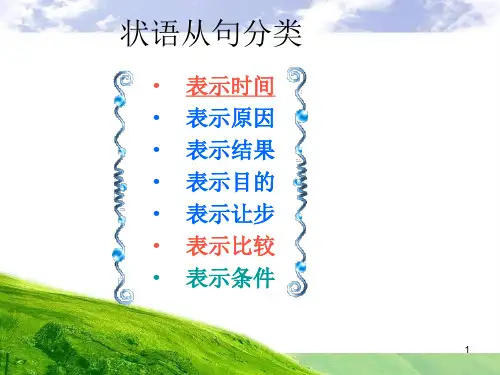
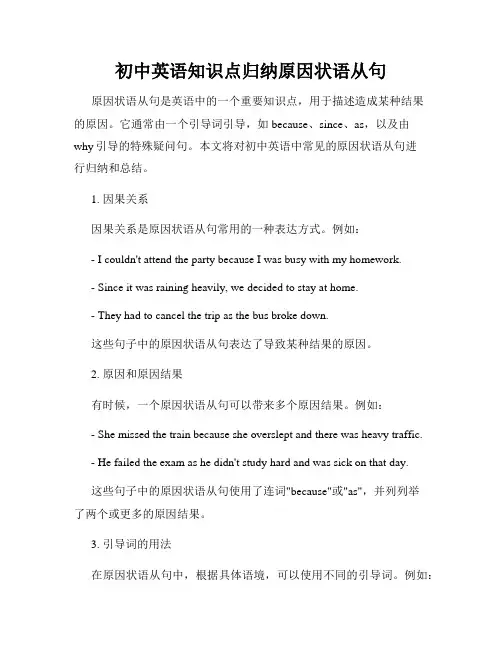
初中英语知识点归纳原因状语从句原因状语从句是英语中的一个重要知识点,用于描述造成某种结果的原因。
它通常由一个引导词引导,如because、since、as,以及由why引导的特殊疑问句。
本文将对初中英语中常见的原因状语从句进行归纳和总结。
1. 因果关系因果关系是原因状语从句常用的一种表达方式。
例如:- I couldn't attend the party because I was busy with my homework.- Since it was raining heavily, we decided to stay at home.- They had to cancel the trip as the bus broke down.这些句子中的原因状语从句表达了导致某种结果的原因。
2. 原因和原因结果有时候,一个原因状语从句可以带来多个原因结果。
例如:- She missed the train because she overslept and there was heavy traffic.- He failed the exam as he didn't study hard and was sick on that day.这些句子中的原因状语从句使用了连词"because"或"as",并列列举了两个或更多的原因结果。
3. 引导词的用法在原因状语从句中,根据具体语境,可以使用不同的引导词。
例如:- Because he was tired, he fell asleep during the movie.- Since she loves animals, she wants to become a veterinarian.- I don't know why he left early.- She couldn't go to the party as she had to babysit her younger sister.这些句子中的引导词分别是"because"、"since"、"why"和"as",它们根据主句和从句之间的逻辑关系来选择使用。
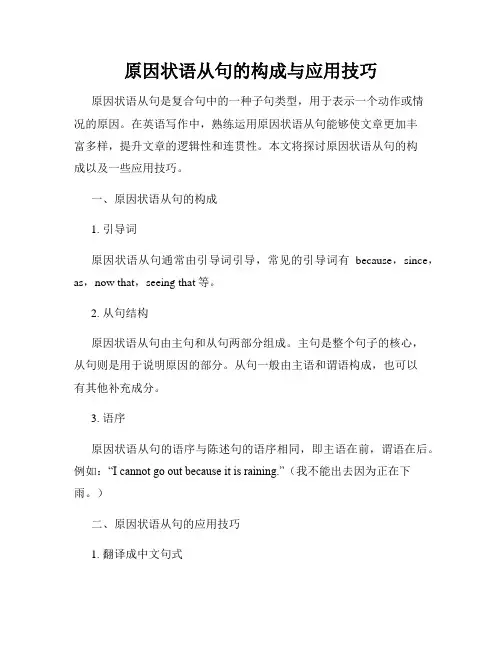
原因状语从句的构成与应用技巧原因状语从句是复合句中的一种子句类型,用于表示一个动作或情况的原因。
在英语写作中,熟练运用原因状语从句能够使文章更加丰富多样,提升文章的逻辑性和连贯性。
本文将探讨原因状语从句的构成以及一些应用技巧。
一、原因状语从句的构成1. 引导词原因状语从句通常由引导词引导,常见的引导词有because,since,as,now that,seeing that等。
2. 从句结构原因状语从句由主句和从句两部分组成。
主句是整个句子的核心,从句则是用于说明原因的部分。
从句一般由主语和谓语构成,也可以有其他补充成分。
3. 语序原因状语从句的语序与陈述句的语序相同,即主语在前,谓语在后。
例如:“I cannot go out because it is raining.”(我不能出去因为正在下雨。
)二、原因状语从句的应用技巧1. 翻译成中文句式将原因状语从句翻译成中文句式有助于更好地理解和运用。
例如:“Since you are tired, you should rest.”(既然你累了,你应该休息。
)中的“Since you are tired”可翻译为“既然你累了”。
2. 灵活使用引导词除了使用常见的引导词外,还可以根据具体语境选择更加恰当的引导词。
例如,对于引导转折关系的原因状语从句,可以使用although,while等引导词,如“Although it's raining, I will still go to the park.”(尽管下雨,但我仍会去公园)。
3. 使用简洁明了的句式为了使文章表达更加简洁明了,可以将原因状语从句放在句首或句尾。
例如,句首位置:“Because I was late for work, I missed the meeting.”(因为我上班迟到了,我错过了会议。
);句尾位置:“I missed the meeting because I was late for work.”(我错过了会议,因为我上班迟到了。
原因状语从句定义一、原因状语从句的定义原因状语从句,顾名思义,是用来解释某件事发生的原因。
最常用的一个从属连词叫做because,常用来强调原因,尤其在阅读篇章汇总,because一词之后通常是关键信息。
二、原因状语从句引导词引导原因状语从句的从属连词有because(因为),for(因为),as(由于),since(既然),now(that)(既然),when(既然),seeing(that)(由于,鉴于),considering(that)(考虑到),given(that)(考虑到),in that等,除了这些大家比较熟悉的引导原因状语从句的从属连词外,when有时也可引导原因状语从句(表示“既然”)。
三、原因状语从句基本用法1、because的用法:because通常表示直接的原因。
because引导的从句表示直接而明确的原因和理由,表示按因果关系的推断,语气很强,用来回答why的问题,一般位于主句之后。
例:We couldn't go out because it was too cold.因为天气太冷,我们不能外出。
2、for的用法:for是并列连词,引出的原因较间接,似乎是事后所想到的补充解释的理由,只陈述一般推断的理由,不一定表示产生结果的必然原因,主要放在两个并列句之间。
例:It must be morning for the birds are singing.一定是清晨了,因为鸟儿在叫。
注意:下列情况下只能使用because:①在回答why的问句时;②在用于强调句型时;③被not所否定时。
3、as和since的用法:表示已经知道的原因时用as或since,即某种原因在说话人看来已经很明显,或已为听话人所熟悉。
since要比as正式一些,它们通常被置于语句之前。
4、now that(既然)的用法:now that同since相似,语气较弱,强调人们已知的事实。
例:Now that you are busy,let me do it for you/take care of the new teachers.既然你忙,就让我给你做吧。
原因状语从句的用法
原因状语从句是一种从属于主句的从句,用来说明引起某种结果或情况的原因。
它通常由连词"因为"、"由于"、"由此"、"所以"、"由"等引导。
原因状语从句通常放在句首,但也可以放在句中或句尾。
它与主句之间有一定的逻辑关系,形成一个因果关系。
例如:
1.由于下雨,我们取消了郊游计划。
2.我们错过了火车,因为交通拥堵。
3.他没有收到邀请,所以没有参加派对。
原因状语从句可以用来解释、说明一些事件、情况的原因,帮助听话方更好地理解上下文的关系。
它可以用于口语交流、写作、新闻报道等场合中。
除了常用的"因为"、"由于"、"所以"等连词,还有一些其他的连词和短语也可以用于引导原因状语从句,例如:"既然"、"既是...也
是..."、"出于"、"由此可见"等。
这些连词和短语在句子中的位置和语态可能有所变化,但作用都是引导原因状语从句。
要特别注意的是,原因状语从句使用的时态应根据主句的时态和语境来确定。
如果主句是过去时,则原因状语从句多使用过去时。
如果主句是现在时,则原因状语从句可以使用现在时,过去时或可能将来时,视具体情况而定。
总的来说,原因状语从句的用法很灵活,可以在句子中起到连接主句与状语从句的作用,并帮助读者或听众更好地理解句子的含义和逻辑关系。
状语从句与原因的关系在英语语法中,状语从句是指一个从句在句子中作为状语来修饰动词、形容词或者副词。
而原因是造成某种情况或行为发生的根本原因。
在句子中,状语从句与原因之间存在着密切的关系。
本文将探讨状语从句与原因的关系,分析其用法和示例。
一、状语从句的基本用法状语从句是由连词或连词词组引导的,用来表达时间、地点、条件、原因等方面的信息。
其中,原因状语从句用来表达某个动作或情况发生的原因,可以是自然原因、客观原因或主观原因。
常见的引导词有“because”、“since”、“as”、“due to”等。
1. 因果关系的状语从句原因状语从句用来解释为什么某个动作或情况发生。
例如:- She failed the exam because she didn't study hard.(她考试不及格是因为她没有用心学习。
)- Since it was raining heavily, we decided to stay at home.(由于雨下得很大,我们决定待在家里。
)这些例子中,状语从句“because she didn't study hard”和“Since it was raining heavily”解释了为什么“she failed the exam”和“we decided to stayat home”。
2. 时间和原因的状语从句有时状语从句可以同时表示时间和原因。
例如:- We arrived late because the traffic was really bad.(我们迟到了,因为交通非常堵。
)在这个例子中,“because the traffic was really bad”既解释了为什么“we arrived late”,同时也表示了导致迟到的时间原因。
3. 条件和原因的状语从句状语从句也可以表示条件和原因。
例如:- I didn't go to the party since I was not invited.(我没有去派对是因为我没有收到邀请。
英语中考语法原因状语从句详细讲解和讲义第一:什么叫原因状语从句?一定义:在中考英语中,原因状语从句(Causal Adverbial Clause)是一种从属于主句的从句,用来说明主句发生的原因或理由。
原因状语从句通常由引导词引导,例如“because”、“since”、“as”等。
原因状语从句可以回答主句中的“why”问题,帮助我们理解主句的原因或动机。
它们提供了更多的信息,使句子更加完整和准确。
原因状语从句与主句之间存在一种因果关系,主句的发生或行为是由从句中描述的原因或理由所引起的。
二、注意:1.选择正确的引导词:原因状语从句通常由“because”、“since”、“as”等引导。
我们需要根据句子的意思和语境来选择正确的引导词。
2.句子结构:原因状语从句应该放在主句之前或之后,并用逗号隔开。
例如:“Since it's raining outside, we should stay indoors.”或者“We should stay indoors since it's raining outside.”3.时态和语态:原因状语从句的时态和主句的时态要保持一致。
例如,如果主句是现在时,那么原因状语从句也要用现在时。
此外,被动语态也可以使用在原因状语从句中。
4.注意否定形式:当主句是否定句时,原因状语从句的引导词通常改为“because of”或“due to”,而不是“because”。
5.避免歧义:在使用原因状语从句时,我们需要确保从句与主句之间存在明确的因果关系,避免歧义或误导读者。
第二:中考英语中常见的原因状语从句有以下几种:1.because 引导的原因状语从句:表示直接原因,通常放在主句后面,2.since 引导的原因状语从句:表示给出一个既定的前提条件,通常放在主句前面,例如:Since it's raining outside, we should stay indoors.3.as 引导的原因状语从句:表示给出一个事实或理由,用于解释或支持主句的观点,通常放在主句后面,例如:He didn't go to work today, as he is sick.4."for" 引导原因状语从句:表示给出一个理由或解释。
原因状语从句原因状语从句是复合句中的一种从句结构,通常用来表示某个动作或事件发生的原因。
在语法上,原因状语从句由一个引导词引导,这个引导词可以是because, since, as, for等。
原因状语从句在句子中起到解释、说明某个动作或者事件发生原因的作用。
下面将从原因状语从句的定义、用法、引导词以及一些例句来详细介绍原因状语从句。
一、定语从句概述原因状语从句(adverbial causal clause)是由从属连词because, since, as, for等引导的从句,用来表示一个动作或事件发生的原因。
在使用原因状语从句时,需要注意主句和从句之间的时态一致性,以及从句中是否需要倒装。
此外,在选择引导词时,需根据具体语境和句意进行选择。
二、原因状语从句的用法原因状语从句通常放在句子的首位或末位,用于解释某一行为或事件发生的原因。
它可以对一个事实进行推理或解释,使整个句子更加具有说服力。
三、原因状语从句的引导词1. becausebecause是最常用的原因状语从句引导词,用来表示直接的原因。
例如:- I couldn't attend the meeting because I had a doctor's appointment.(因为我有个医生预约,我无法参加会议。
)2. sincesince也是一个常见的原因状语从句引导词,用来表示过去的原因或已知的原因。
例如:- Since it was raining heavily, we decided to stay at home.(由于雨下得很大,我们决定待在家里。
)3. asas可以用来引导原因状语从句,表示正式和书面的语气。
例如:- As I was feeling tired, I went to bed early.(由于我感到疲倦,我早早上床休息了。
)4. forfor用来引导原因状语从句时,通常用于强调和解释前面所提到的原因。
原因状语从句原因状语从句表原因,引导原因状语从句的从属连词主要的有because, as, since, for,seeing (that), now (that), considering (that),in that等。
以下逐一介绍常见的原因状语从句的引导词:because引导的原因状语从句一般放于主句之后,because表示直接原因,语气最强,最适合回答why引导的疑问句。
例如:I do it because I like it. 我做这件事是因为我喜欢。
注意:“not ... because”结构中的not否定的是because引导的整个从句,例如:The country is not strong because it is large. 国强不在大。
since引导的原因状语从句一般放于主句之前表示已知的、显然的理由(通常被翻译成“既然”),较为正式,语气比because弱。
例如:Since you are free today, you had better help me with my mathematics. 既然今天你休息,你最好帮我补习数学。
注意:seeing (that),now (that),considering (that),in that这几个词汇与since引导的原因状语从句意思相近,都表示“既然”。
例如:Seeing (that) he refused to help us, there’s no reason that we should now help him. 他既然曾经拒绝帮助我们,我们现在没有理由要来帮助他。
Now (that) you are grown up, you should not rely on your parents. 既然你长大了,就不应该依靠你的父母了。
Considering (that) everybody is here, let’s begin our discussion. 既然大家都到了,我们就开始讨论吧。
In that he is ill, he feels unable to do it. 因为有病,他觉得做不了那件事。
as 引导原因状语从句时表示附带说明的“双方已知的原因”,语气比since弱,较为正式,位置较为灵活(常放于主句之前)。
例如:As it is raining, you’d better take a taxi. 既然在下雨,你最好乘出租汽车。
As you are tired, you had better rest. 既然累了,你最好休息一下。
I went to bed early, as I was exhausted. 我睡得早,因为我筋疲力尽了。
for引导的原因状语从句并不说明主句行为发生的直接原因,只提供一些辅助性的补充说明,for引导的原因状语从句只能放于主句之后并且必须用逗号将其与主句隔开。
例如:He could not have seen me, for I was not there. 他不可能见过我,因为我不在那里。
比较:because, since, as和forbecause语势最强,表示不知道的原因用because,即说话人认为听话人不知道。
因此because 从句是全句最重要的部分,通常被放置于主语之后。
当原因是显而易见的或已为人们所知,就用as或since。
I didn't go, because I was afraid.Since /As the weather is so bad, we have to delay our journey.for虽然表示不知道的原因,但因语气比because弱得多,是可说可不说的话,只能位于主语之后,这时,for是并列连词,如果不是因果关系,而是对前面主语内容加以解释或推断时,只能用for。
He is absent today, because / for he is ill.He must be ill, for he is absent today.注1:除以上提到的大家比较熟悉的引导原因状语从句的从属连词外,when有时也可引导原因状语从句(when表示“既然”)I won’t tell you when you won’t listen. 既然你不想听,我就不告诉你了。
注2:because习惯上不与so连用汉语习惯上说“因为…所以…”,但英语习惯上却不能将so与because 连用:因为下雨,所以我们呆在家里。
正:Because it was raining, we stayed at home. / It was raining, so we stayed at home.误:Because it was raining, so we stayed at home.注3:because 从句与because of短语的转换Because引导的原因状语从句有时可与because of 短语转换,because of后加的原因可以为好或坏但最正规的还是becauseHe can’t come because he is ill. / He can’t come because of his illness. 他因病不能来。
I said nothing about it because his wife was there. / I said nothing about it because of his wife’s being there. 因为他妻子在那儿,我对此事只字未提。
[考题1] ____ you’ve got a chance, you might as well make full use of it.A. Now thatB. AfterC. AlthoughD. As soon as[答案] A[解析] 主句与从句之间存在因果关系,且“you’ve got a chance”表示一个显而易见的原因,因此应选用表原因的now that。
[考题2] He found it increasingly difficult to read, ____ his eyesight was beginning to fail.A. andB. forC. butD. or[答案] B[解析] “his eyesight was beginning to fail”是“he found it increasingly difficult to read”的原因,因此本题应选用可以表示原因的连词for引导原因状语从句。
[考题3] A man cannot smile like a child, ____ a child smiles with his eyes, while a man smiles with his lips alone.A. soB. butC. andD. for[答案] D[解析] 下划线处之后的句子补充说明“a man cannot smile like a child”的原因,应选用for 表原因。
原因状语从句练习题I. 在下列句子的空格中填入适当的连词(每空一词):1. ________ Jane was the eldest, she looked after the others.2. ________ you know it, I won't repeat it.3. He didn't hear the knock at the door ________ he was listening to the radio.4. —Why didn't you come?—________ my father wouldn't let me.5. ________ ________ everybody is here, let's begin the discussion.II. 句型转换(把下列复合句转换为简单句):I)把从句简化为because of 结构:1. He lay in bed because he had caught a bad cold.2. He couldn't walk because his leg was broken.3. I came back because it was raining.4. They stayed in because the weather was bad.5. We didn't get home till after midnight because we had missed the bus.II)把从句简化为分词短语:6. As he is a warmhearted man, he is always ready to help others.7. As he saw nobody in, he decided to leave a note.8. Because he didn't understand its meaning, he asked the teacher to explain the word.9. As he had lived in Beijing for many years, he knew the city very well.10. As I have not seen the film, I can't tell you what I think of it.11. As they were influenced by Lei Feng's example, they did a lot of good deeds.12. As he was brought up in the countryside, he was not used to the city life.III)把从句简化为形容短语:13. Because he was afraid of being late for class, Bob ran to school as fast as he could.14. As he was full of ear, Crusoe left the cave in a hurry.15. As he was anxious for a quick decision, the chairman called for a vote.Key:I. 1. As 2. Since 3. because 4. Because 5. Now that/Seeing thatII. 1. He lay in bed because of a bad cold.2. He couldn't walk because of a/his his broken leg.3. I came back because of the rain.4. They stayed in because of the bad weather.5. We didn't get home till after midnight because of missing the bus.6. Being a warm-hearted man, he is always ready to help others.7. Seeing nobody in, he decided to leave a note.8. Not understanding its meaning, he asked the teacher to explain the word.9. Having lived in Beijing for many years, he knew the city very well.10. Not having seen the film, I can't tell you what I think of it.11. Influenced by Lei Feng's example, they did a lot of good deeds.12. Brought up in the countryside, he was not used to the city life.13. Afraid of being late for class, Bob ran to school as fast as he could.14. Full of ear, Crusoe left the cave in a hurry.15. Anxious for a quick decision, the chairman called for a vote.。